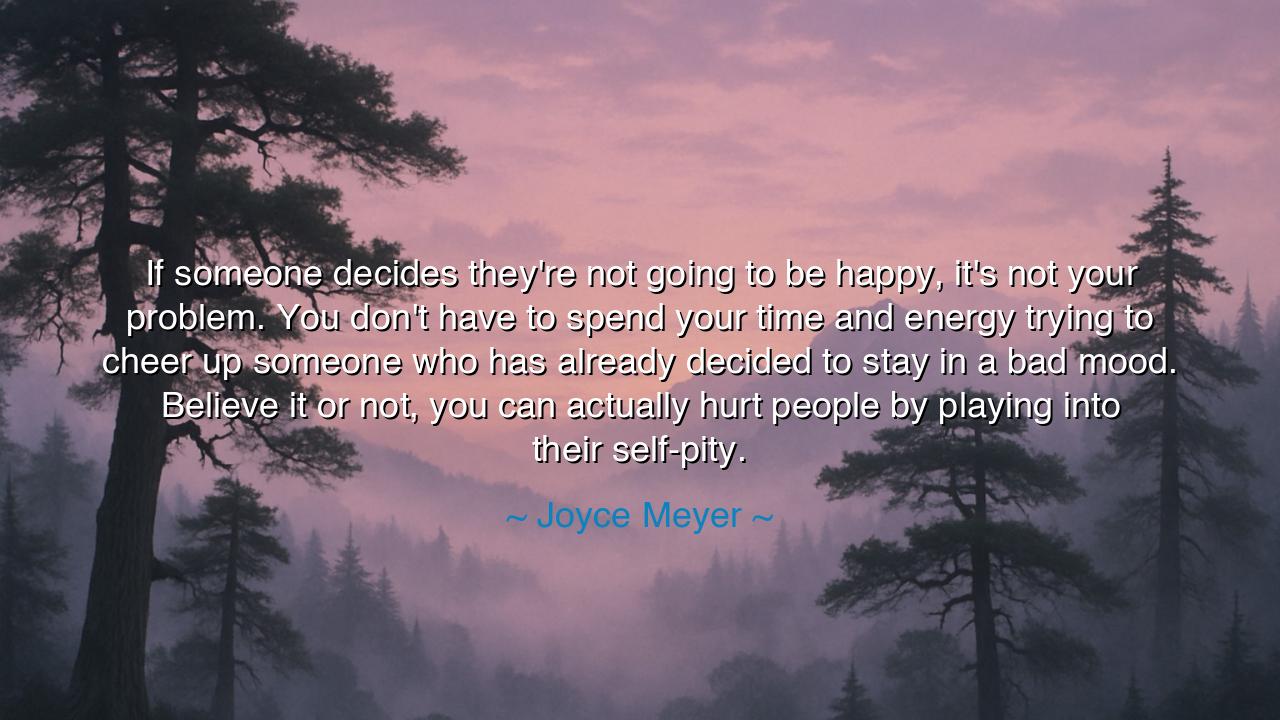
If someone decides they're not going to be happy, it's not your
If someone decides they're not going to be happy, it's not your problem. You don't have to spend your time and energy trying to cheer up someone who has already decided to stay in a bad mood. Believe it or not, you can actually hurt people by playing into their self-pity.






Hear, O seekers of peace and wisdom, the words of Joyce Meyer, who spoke with clarity of the heart’s burdens: “If someone decides they're not going to be happy, it's not your problem. You don't have to spend your time and energy trying to cheer up someone who has already decided to stay in a bad mood. Believe it or not, you can actually hurt people by playing into their self-pity.” These words strike with both compassion and firmness, for they remind us of a truth often forgotten: happiness is a choice, and sorrow, when clung to, becomes a prison no other can break.
The meaning is this: while love calls us to kindness and empathy, it does not call us to be prisoners of another’s refusal to embrace joy. There are those who, wounded by life, turn inward and decide to remain in bitterness, anger, or self-pity. To continually pour your strength into lifting them when they resist is to drain your spirit and to deny them the responsibility of their own healing. For no man or woman can change another’s heart unless that heart first wills to be changed.
History gives us many lessons in this truth. Consider the tale of Job’s friends in the ancient scriptures. They came to comfort him in his suffering, but instead of strengthening him, they fed his grief with blame and shallow counsel. Their attempts to fix him only deepened his sorrow. It was not until Job himself lifted his eyes to the Almighty that his soul found peace. So too does Meyer warn us: when we indulge another’s self-pity, we may do harm, for we entangle them deeper in the very chains we hope to break.
Think also of leaders like Abraham Lincoln, who carried the burden of a nation divided. He was known to have a melancholy spirit, yet he chose not to sink into despair but to act with courage. Had his companions encouraged him only to wallow, to remain in sorrow, he could not have led with strength. Instead, he surrounded himself with those who challenged him, who spoke honestly, who reminded him of duty. In this, we see the balance of compassion and accountability—an eternal lesson.
The origin of Meyer’s teaching is rooted in spiritual discernment. She reminds us that pity can be misused, that it can become a comfort to the wounded pride rather than a medicine to the soul. True love does not feed despair; it calls the other upward. To continually soothe someone who refuses joy is not mercy but harm, for it allows them to remain in darkness. Just as a physician must sometimes apply bitter medicine, so must we sometimes withhold indulgence, lest love become poison.
The lesson for us is clear: guard your energy and discern where your compassion should flow. To encourage, to comfort, to lift—these are holy works. But to entangle yourself endlessly in another’s refusal to rise is to squander the strength you were given to shine. Let each soul bear responsibility for their own happiness. Offer light, but do not dwell forever in another’s shadow if they refuse to step out of it.
Practically, this means setting boundaries. When you see a friend, a loved one, or a companion dwelling in endless bitterness, offer them encouragement once, twice, even many times—but know when to step back. Do not allow guilt to chain you to their decision. Continue to live with joy, and let your life itself become the testimony that happiness is possible. In time, your example may inspire where your words could not.
So, O listeners, remember Joyce Meyer’s truth: you cannot heal those who refuse to be healed, nor can you carry another’s choice as your own. Offer compassion, but guard your spirit. Refuse to feed the fires of self-pity, for in doing so you serve neither yourself nor them. Instead, walk in joy, shine in truth, and invite others to rise—but let them take the step. For in the end, each soul must decide its own happiness, and each life is tested by how it chooses to meet the day.
––






AAdministratorAdministrator
Welcome, honored guests. Please leave a comment, we will respond soon